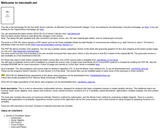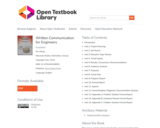
This is a module about creating OER with Open Author
- Subject:
- Computing and Information
- Material Type:
- Homework/Assignment
- Author:
- Mindy Boland
- Date Added:
- 02/21/2020

This is a module about creating OER with Open Author

This is a text on elementary multivariable calculus, designed for students who have completed courses in single-variable calculus. The traditional topics are covered: basic vector algebra; lines, planes and surfaces; vector-valued functions; functions of 2 or 3 variables; partial derivatives; optimization; multiple integrals; line and surface integrals.
![Women in Science: Why So Few? [Liberal Arts: Math and Science]](https://vivaopen.oercommons.org/static/newdesign/images/materials/default-thumbnail-index.png)
This assigment was developed in the context of LaGuardia's Center for Teaching and Learning sponsored Learning Matters mini grant Connection Between First Year Seminar and Capstone Learning Experiences. It provides Liberal Arts experience to students across the academic spectrum and is designed for students in LMF 101 (First-Year Seminar for Liberal Arts: Math & Science) and is conducted in conjunction with students from a capstone course, LIB 200 (Science, Technology, and Humanism). The assignment aligns with the Inquiry and Problem-Solving Core Competency and the Written Ability. In this assignment, LMF 101 students research and read several articles centered on the topic of Women in STEM. They then write an essay that integrates the information from these sources to address the history, biases, and potential causes of the underrepresentation of Women in STEM. LIB 200 students peer review these essays, and LMF 101 students, in turn, respond to these peer reviews. The assignment concludes with a combined class discussion on the topic and the process. The overall goals for this assignment which also reflect the dimensions of the Inquiry and Problem Solving Core Competency and the Written Communication Ability rubrics are the following: Students will utilize the appropriate library search engines to find a resource relevant to a particular topic. Students will analyze and integrate evidence from multiple sources on a complicated topic, and they will use the evidence they gathered to answer questions and arrive at logical conclusions. Students will assess the reliability of data and/or claims made in the literature. Students will cite sources appropriately. Students will understand the importance of peer review, understand how constructive criticism can help improve scholarly work, and learn how to respond to feedback in ways to improve the outcome of their work.
LaGuardia's Core Competencies and Communication Abilities
Main Course Learning Objectives:
LMF 101 Course Goals Associated with Assignment: Demonstrate understanding of habits of mind essential to college success (e.g., persistence, flexibility, and metacognition) and foundational knowledge in mathematics and science. Interpret the values and ethics of mathematics and science and discuss how these values and ethics directly influence personal, academic, and professional success in their careers. Demonstrate an understanding of the structure and logic of technical writing; show a basic level of proficiency in the fundamental writing, reading and speaking skills necessary to deliver information in a contextual and coherent manner. Demonstrate the use of skills and knowledge gained from diverse experiences to enhance learning and success. Describe the diversity of LaGuardia Community College and demonstrate capacities to collaborate across differences in culture and perspective.
LIB 200 Course Goals Associated with Assignment Identify the terminology and concepts central to the field of gender and women‰Ûªs studies students. Identify and understand the challenges and the historical frame of the underrepresentation of women across STEM fields. Research and value the contributions of women to STEM fields. Examine and interpret material using the theory and research methods of gender and women‰Ûªs studies and apply these ideas to current social issues. Present ideas concerning gender and women's studies in spoken and written presentations.

This is an introduction to work with files in Python.
Prior knowledge of variables, assignments, expressions, input-output, lists, conditionals, and loops is recommended.
For CS0 students. Part of the CUNY CS04All project.

This course packet seeks to develop the upper level engineering student’s sense of audience and purpose in a research-based context with workplace constraints. It requires the student to choose a technical topic of interest and research it to solve for a specific problem or to meet a typical industry need by way of several assignments: Unsolicited Research Proposal, Progress Report, Visual Aids, and Oral Presentation, all of which lead to the Formal Report. This approach readies students to write informatively and persuasively in the engineering workplace, providing excellent examples of each assignment contributed by former students whose Formal Reports have won first place in the annual Technical Writing Competition. Because users can rely on demonstrably excellent student examples to understand the concepts behind assignments that build on one another rather than on disparate textbook examples, they tend to write better and to be more confident producing documents and giving presentations. In short, they recognize they are among their own in a class that challenges many engineering students. Moreover, since all the Formal Reports have won awards, convincing students they are using good models with which to create their own documents is relatively easy. Finally, mining excellent student documents makes certain skill-sets clearer, according to former students. For instance, students can follow along as the writer does the following: identifies and proves a problem or need exists; creates the research objectives that lead to the method with which they will address the issue; and develops persuasive strategies for convincing both executive and engineering readers. Similarly, these student papers demonstrate how to discern among results, conclusions, and recommendations and show correct use of sources and visuals.
Table of Contents
Unit 1: Project Planning
Unit 2: Job Search
Unit 3: Research Topic Review
Unit 4: Email Inquiry
Unit 5: Results, Conclusions, Recommendations
Unit 6: Audience Analysis
Unit 7: Proposal
Unit 8: Visual Aids
Unit 9: Progress Report
Unit 10: Formal Report
Unit 11: Speech
Unit 12: Honor/Integrity, Plagiarism, Documentation Quizzes